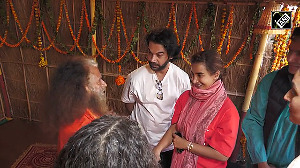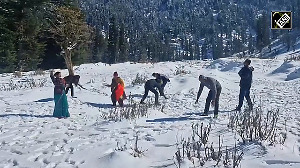Amid rising global pressure against its intensified crackdown on Tibetans, China on claimed that over 660 pro-independence protesters had surrendered for their alleged role in the unrest which left 20 people dead as it escorted foreign journalists to the riots-scarred Lhasa.
Police have released a list of 53 people wanted for the riots and announced on Monday that five suspects, including three women, had been detained for their role in burning 10 persons to death in two cases.
More than 280 people had turned themselves in to police in the Tibetan capital Lhasa, the official Xinhua news agency claimed while state-run China Daily reported that another 381 had surrendered in Aba County in Sichuan province, where trouble had spread from Lhasa.
"Most of those who have come forward are ordinary people and monks who were deceived or coerced (by the rioters)," Shu Tao, party chief of the village of Luoerda, where 63 people handed themselves in to police, said.
Partly breaking the barrier to reporting from Lhasa, which had remained out of bounds to reporters, Chinese government flew a chosen few foreign journalists from Beijing to the Tibetan capital, 12 days after it was rocked by the worst riots in 20 years.
After days of calm, violence had erupted in Garze prefecture in Sichuan province on Monday, in which rioters armed with knives and stones attacked policemen, killing one officer, taking the toll in the riots to 20. More than 700 people were also injured in the unrest.
The Tibetan government in exile in India has maintained that the death toll in the unrest is 140.
China has been repeatedly pointing the accusing finger at the Dalai Lama and his 'clique' or supporters for the violence whose sudden eruption rattled the Communist party leadership at a time when the country is eager to showcase itself through the Olympics in Beijing in August.
The latest Tibetan unrest has not only brought unwanted attention ahead of the Olympics in which billions of dollars and huge prestige has been invested but also a cacophony of global calls to hold a dialogue with the Dalai Lama.
Ignoring the calls, China has asked the international community not to provide 'any support in any form' to the Dalai Lama and his 'separatist activities'.
The monks-led demonstrations against the Chinese rule in Tibet began on a peaceful note on March 10 to mark the 49th anniversary of the failed uprising against Chinese rule in 1959 but spiralled out of control leading to large-scale violence.





 © 2025
© 2025